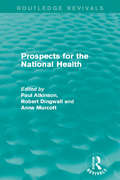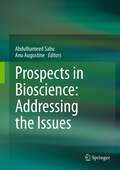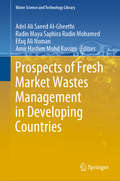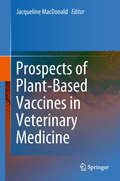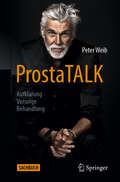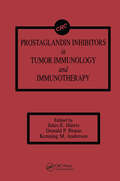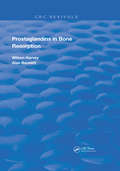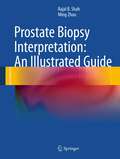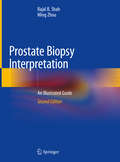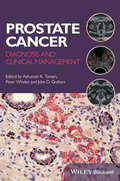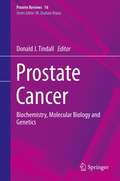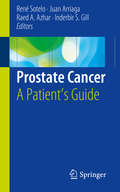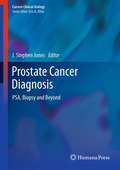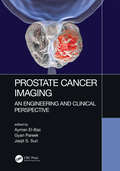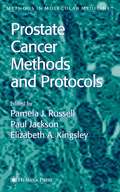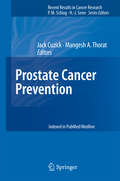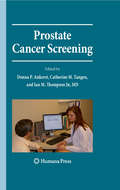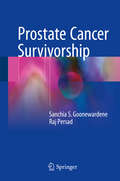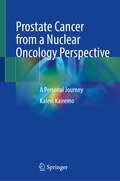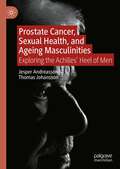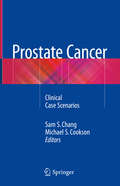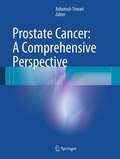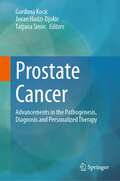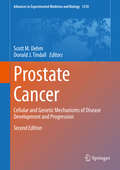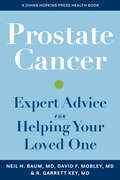- Table View
- List View
Prospects for the National Health (Routledge Revivals)
by Paul Atkinson, Robert Dingwall and Anne MurcottThe British National Health Service celebrated its thirtieth birthday in 1978. A Royal Commission was set up to consider the role of the National Health Service, and it is the debates that surrounded this Royal Commission that form the basis for the twelve topics covered by this book. The economic difficulties that the country was facing when this book was published in 1979 highlighted the widely publicised malaise in the health service, and exposed the limitation of a set of ideals developed by the NHS in the years after the Second World War. These limitations, reflected in the economic recession of all industrial countries, presented a challenge and thus an opportunity to re-examine the nature and purpose of our health service. Although this work offered no easy solutions, it did present significant implications for public debate and public appraisal of the prospects of the National Health Service, and greatly mirrors the debates that have been stirring in more recent years. This title will be of interest to students of sociology.
Prospects in Bioscience: Addressing the Issues
by Abdulhameed Sabu Anu AugustineThe book entitled "Prospects in Bioscience: Addressing the issues" is a collection of selected research papers presented at the International Conference on Advances in Biological Sciences (ICABS) organized by the Department of Biotechnology and Microbiology and the Inter University Centre for Bioscience, Kannur University, Kerala, India. ICABS witnessed a unique spectrum of Scientific Programmes on the most recent and exciting developments in modern biology. The conference displayed the numerous breakthroughs and significant developments in the important areas of modern biology and their relevance to the welfare of global society. The Book contains 50 well written chapters, each one discussing scientifically organized findings of original research work done in reputed laboratories. Needless to say, they deal with advances in various disciplines of modern biology including Cell and Molecular Biology, Structural Biology, Industrial and Environmental Biotechnology, Food and Agricultural Biotechnology and Medical Biotechnology. As the title rightly indicates, the chapters project the prospects in the respective areas and the issues in them. Specific issues discussed in the book includes development of transgenic plants, bioremediation of toxic industrial effluents, biotransformation for novel antibiotics, biofertilizer development, molecular drug designing and structure elucidation, molecular identification of pathogens, production of anti microbials, biocontrol agents and bioactive molecules, cancer biology, plant breeding and hybrid seed production etc. The book with its contents spreading across the vast arena of modern biology is expected to cater to the need of researchers, technologists and students.
Prospects of Fresh Market Wastes Management in Developing Countries (Water Science and Technology Library #92)
by Radin Maya Saphira Radin Mohamed Adel Ali Saeed Al-Gheethi Amir Hashim Mohd Kassim Efaq Ali NomanThis book focuses on the prospects of fresh market waste management in developing countries. It characterizes fresh market wastewater and solid wastes, and highlights the human health impact of corresponding waste management practices. With regard to treatment technologies, the book discusses the anaerobic digestion of fresh solid wastes; the application of natural coagulants for wastewater treatment; the remediation of xenobiotics in wastewater using nanotechnology; and biofilter aquaponic systems for nutrient removal. All of these technologies are recent innovations, offer several concrete advantages, and can be applied in developing countries as non-central treatment systems. In addition, the book covers electricity production from fresh solid wastes using microbial fuel cells, demonstrating the potential held by recycling fresh market wastewater and solid wastes.
Prospects of Plant-Based Vaccines in Veterinary Medicine
by Jacqueline MacDonaldThis book provides an in-depth explanation of the advantages and current limitations of recombinant plant-made vaccines for use in veterinary medicine, including for livestock, pets, and wild animals. Written by top scientists in the field, it discusses the background to and latest scientific advances in plant-made vaccines for the most commonly targeted veterinary infections. With the recent high-profile research into recombinant plant-made therapeutics for Ebola and Zika viruses, it is likely that the products will be commercialized and widely used in the future. Plant-made therapeutics have a variety of advantages over those made in traditional systems; however, their most fruitful application may be in veterinary medicine, due to less stringent regulations and a greater need for low-cost products.
ProstaTALK: Aufklärung – Vorsorge – Behandlung
by Peter WeibAufklärungsbuch zur Prostata - mit vielen Antworten auf Fragen, die Sie sich sonst nicht trauen, zu stellen!"Cool" ist der Mann, der sich informiert und zur Früherkennung geht! Viele Männer erkranken irgendwann in ihrem Leben an der Prostata, haben aber oft nur eine vage Vorstellung von der Bedeutung und Funktion dieses Organs. Das führt häufig zu Unsicherheit und Sorge.In diesem Sachbuch informiert der Experte - unterhaltsam aber auch fachlich fundiert - über Formen und Ursachen der häufigsten Prostata-Erkrankungen sowie über moderne Diagnosemöglichkeiten und Therapieverfahren, inklusive alternativer Behandlungsverfahren. Es bietet Männern und engagierten PartnerInnen klare und verständliche Informationen und einen guten Überblick zur Funktionsweise des Organs, zur Früherkennung und Behandlung. Anhand von zahlreichen Patientenfragen aus der Sprechstunde werden die Prostatavergrößerung, der Prostatakrebs und die Prostataentzündung erklärt, Früherkennung und Behandlungswege aufgezeigt. Für jeden "coolen" Mann, der sich dem Thema Vorsorge auch in dieser Körperregion stellen und bewusst Behandlungsentscheidungen mittragen möchte.
Prostaglandin Inhibitors in Tumor Immunology and Immunotherapy
by Jules E. Harris Donald P. Braun Kenning M. AndersonThis book provides an updated overview of eicosanoid metabolism. It also presents a timely discussion of eicosanoid metabolism in the process of tumor cell metastasis, in chemoprotection and radioprotection associated with cancer therapy, and in cell differentiation. The book focuses on the role of eicosanoids in the immunology of malignant disease. This includes how various immune cell populations in cancer are affected by the secretion and action of various eicosanoids and metabolites of eicosanoids and how these processes may be affected by various pharmacological manipulations and interventions to augment anti-tumor immunity. Head and neck cancer is covered in great detail to illustrate a cancer in humans where these considerations are particularly relevant. This important volume demonstrates that the principal factor in cancer patient immunologic deficiency is related to excess secretion by monocytes of prostaglandins.
Prostaglandins In Bone Resorption (Routledge Revivals)
by Alan Bennett Wilson HarveyFirst Published in 1988, this book offers a full, comprehensive guide into the process of bone resorption. Carefully compiled and filled with a vast repertoire of notes, diagrams, and references this book serves as a useful reference for Students of Osteology, and other practitioners in their respective fields.
Prostate Biopsy Interpretation: An Illustrated Guide
by Ming Zhou Rajal B. ShahThis book covers all the practical issues related to the interpretation of prostatic biopsies in day-to-day practice, including: biopsy sampling and processing; the diagnosis of limited cancer; differentiation of prostate cancers from benign lesions and recognition of histologic variants; the recognition and clinical significance of "atypical" diagnoses and HGPIN; the identification of recently described entities; the contemporary approach to Gleason grading; the utility of immunohistochemical markers and emerging molecular markers; and the reporting of prostate biopsies. Algorithms, flow charts, and tables are used throughout to simulate the thought and decision-making process upon encountering common clinical scenarios during sign-out of prostate biopsy. The book is richly illustrated with carefully selected, high-quality color images and will appeal especially to practicing surgical pathologists as well as pathology residents and fellows in training.
Prostate Biopsy Interpretation: An Illustrated Guide
by Ming Zhou Rajal B. ShahThis book retains the core contents of the successful first edition and covers all the practical issues related to prostate biopsy diagnosis in day-to-day practice. It uses abundant algorithms, flow charts, and tables to simulate a pathologist’s thought process and assist decision making during evaluation of prostate biopsies. Chapters address the most effective ways to evaluate a prostate biopsy and how to formulate a diagnostic approach upon encountering a specific clinical problem. Pertinent new information is incorporated in all chapters, particularly in how novel diagnostic tools such as MRI and genomic tests may affect prostate biopsy practice and diagnosis. An entirely new chapter on pattern-based approaches to prostate biopsy interpretation has been added.The second edition of Prostate Biopsy Interpretation: An Illustrated Guide is not meant to be an all-encompassing, definitive bibliography of pathology of prostate cancer. Instead, it provides practicing surgical pathologists and trainees a quick and handy reference for all the practical issues relevant to day-to-day interpretation of prostate biopsy.
Prostate Cancer
by John D. Graham Peter Whelan Ashutosh K. TewariDo you manage patients with prostate cancer? Could you use an expert guide examining all possible management options?Prostate Cancer: diagnosis and clinical management providesurologists and oncologists of all levels with up-to-date, evidence-based guidance to the diagnosis, treatment and clinical management of a disease which accounts for a quarter of all cancers affecting men.Designed to be as practical and accessible as possible, leading experts discuss key issues in prostate cancer management and examine how to deliver best practice in the clinical care of their patients. Topics covered include:What must be considered when counseling newly-diagnosed cancer patientsRadical surgery options for prostate cancerNovel therapies for localized prostate cancerHow should metastatic prostate cancer be diagnostic and managedWhat are the best methods of administering end of life care for the patientBrought to you by a highly experienced editor team, and containing key points, management algorithms, practice tips and the latest AUA and EAU clinical guidelines, this is the ideal consultation tool for doctors both on the wards and in the office.
Prostate Cancer
by Donald J. TindallProstate Cancer provides an up to date review of the biochemistry, molecular biology, and genetic changes in prostate cells that are the driving forces in the initiation and progression of cancer. It includes an overview by experts in the field of cell-cell interactions, including stem cells, reactive Stromal cells and membrane lipid rafts that are instrumental in the initiation and progression of prostate cancer.
Prostate Cancer
by Inderbir S. Gill René Sotelo Juan Arriaga Raed A. AzharUnderstanding prostate diseases without the proper and reliable guidance can be overwhelming because the internet, television and print media saturate us with information ranging from scientific studies across the world to inspiring stories from cancer survivors to many myths and rumors. How do we interpret all that information? This book intends to help patients and their families to know and understand their diagnosis. Once this has been established, the reader can confidently determine the best choice of treatment, resting assured that the guidance in this book adheres to current international medical standards and has been influenced by the authors' many years of professional experiences. The editors aim to transmit, in a simple and precise manner, only relevant and necessary information to help patients and families that have been diagnosed with prostate diseases.
Prostate Cancer Diagnosis
by J. Stephen JonesBased on the highly successful first edition of Prostate Biopsy: Indications, Techniques, and Complications, this new volume presents new concepts that have emerged in answer to current questions from its audience. Many new perspectives and technologies are presented, many from the authors' internationally recognized work on the topic. Substantial developments in techniques and complications are explored in detail. The chapter authors comprise a complete spectrum of specialists in their respective subject areas. All authors are internationally accepted as the premier authorities on their chosen topics. Prostate Cancer Diagnosis: PSA, Biopsy, and Beyond presents new data on the controversial issue of PSA screening and thresholds as indication to perform biopsy. Office based transrectal saturation biopsy is covered in detail. Other topics explored include template guided biopsy and image-guided biopsy as well as a completely new paradigm for prevention of complications. Prostate Cancer Diagnosis: PSA, Biopsy, and Beyond will be of great value and utility to all practicing urologists.
Prostate Cancer Imaging: An Engineering and Clinical Perspective
by Jasjit Suri Ayman El-Baz Gyan PareekThis book covers novel strategies and state of the art approaches for automated non-invasive systems for early prostate cancer diagnosis. Prostate cancer is the most frequently diagnosed malignancy after skin cancer and the second leading cause of cancer related male deaths in the USA after lung cancer. However, early detection of prostate cancer increases chances of patients’ survival. Generally, The CAD systems analyze the prostate images in three steps: (i) prostate segmentation; (ii) Prostate description or feature extraction; and (iii) classification of the prostate status. Explores all of the latest research and developments in state-of-the art imaging of the prostate from world class experts. Contains a comprehensive overview of 2D/3D Shape Modeling for MRI data. Presents a detailed examination of automated segmentation of the prostate in 3D imaging. Examines Computer-Aided-Diagnosis through automated techniques. There will be extensive references at the end of each chapter to enhance further study.
Prostate Cancer Methods and Protocols
by Paul Jackson Elizabeth A. Kingsley Pamela J. RussellA collection of basic and advanced molecular methods that reveal those markers essential for more accurate diagnoses of specific diseases, and in developing new treatment strategies. The techniques range from in vitro methods to in vivo models of prostate cancer, and include new methods for the accurate diagnosis of prostate cancer, proteome and microarray analyses, and new strategies for the treatment of refractory disease. Each method is described in step-by-step detail to ensure successful results and avoid failure.
Prostate Cancer Prevention
by Jack Cuzick Mangesh A. ThoratProstate cancer is by far the most common cancer in men and the second leading cause of death due to cancer. It comprises a mixed group of tumours displaying varying clinical behaviour: while some have a very aggressive course, others are rather indolent. Prevention of prostate cancer and discrimination between aggressive and indolent forms are important clinical goals and the acquisition of significant new evidence on means of achieving these aims makes this book particularly timely A wide range of topics are covered by leading authorities in the field. The biology and natural history of prostate cancer are reviewed and the role of lifestyle and dietary factors, assessed. Detailed attention is paid to risk prediction biomarkers and to the role of novel high-throughput nucleic acid-based technologies in improving risk prediction and thereby allowing tailored approaches to cancer prevention. Potential means of chemoprevention of prostate cancer are also reviewed in depth, covering the very positive new data on the impact of aspirin as well as evidence regarding 5α-reductase inhibitors, DFMO and lycopene. Guidance is provided on the differentiation of aggressive from indolent disease and the policy and research implications of recent findings are examined. This book will be of interest to both clinicians and researchers.
Prostate Cancer Screening
by Donna Pauler Ankerst Ian M. Thompson Catherine M. TangenMore than one in six men will develop prostate cancer in their lifetime. In recent years there has been an explosion of information regarding PSA screening and biomarkers for the disease. In Prostate Cancer Screening, Second Edition, the world's leading experts on prostate cancer detection update the first edition with the latest findings. The book incorporates a series of thoughtful and cutting-edge works from the world's experts in prostate cancer screening, ranging from the current status quo of prostate cancer screening across the globe to consensus on optimal utilization of the traditional PSA and DRE tests, to cutting-edge research in new biomarkers, biomeasures, and extended risk algorithms for prostate cancer. An additional chapter covers family-based linkage analysis as well as possible pitfalls in prostate cancer biomarker evaluation studies. Timely and authoritative, Prostate Cancer Screening, Second Edition, is an essential text for urologists, oncologists and family physicians, as well as researchers in the biomarker industry who seek methods to better develop and support markers and measures of prostate cancer.
Prostate Cancer Survivorship
by Raj Persad Sanchia S. GoonewardeneThis book provides information on a range of issues related to prostate cancer survivorship, including; psychosexual care, health related quality of life, treatment, follow-up care, new psychosexual pathways, and acute and chronic co-morbidities. The book also covers the needs and challenges in survivorship care, the requirements of care, the future of survivorship care, and role of patient conferences. This book aims to give oncologists, urologists, and specialist nurses help in how to manage patients in the prostate cancer survivorship phase. This guidance is based on real life experiences handling prostate cancer survivorship, and is developed further through utilising the views of both health care professionals and patients.
Prostate Cancer from a Nuclear Oncology Perspective: A Personal Journey
by Kalevi KairemoProvisional text This book provides a comprehensive review of innovative diagnostic methods for prostate cancer, with a particular emphasis on the development of PET radiopharmaceuticals. The author has had the privilege to introduce several tracers into clinical routine practice, including Na18F, 18F-FCH, 18F-FACBC, 68Ga-PSMA11, 18F-PSMA-1007, and 18F-DCFPyL. Thus, indications in various prostate cancer subgroups are discussed in detail, weighing the pros and cons in clinical practice. In the authors´ practice radiation therapy has been more important and surgical applications; therefore, PET based dose planning is presented in detail. Furthermore, the author has closely followed the development of radiopharmaceutical treatments, particularly in the context of bone pain palliation using radiopharmaceuticals, such as 89SrCl2, 186ReHEDP, 153SmEDTMP, 117mSnDTPA, and 223RaCl2, and targeted treatments (177Lu-PSMSA-617, 177Lu-PSMA-I&T and 225Ac-PSMA). Thanks to his experience, the author facilitated the set-up of targeted treatments in various countries: Baltic and Nordic countries, elsewhere in Europe, North America (Canada), and Africa (e.g. Ghana). The author's involvement in promoting therapy tourism to Finland further highlights his breadth of knowledge and practical experience. This book offers valuable insights into the evolving landscape of diagnostic methods and radiopharmaceutical treatments for prostate cancer. With the author's extensive experience and contributions to the field, readers can gain a comprehensive understanding of these advancements and their implications in clinical practice.
Prostate Cancer, Sexual Health, and Ageing Masculinities: Exploring the Achilles' Heel of Men
by Thomas Johansson Jesper AndreassonThis book provides a rich, multidimensional analysis of how prostate cancer is lived, treated, and perceived by different actors through the stages of care, rehabilitation, and recovery. Furthermore, it focuses on how side effects, such as urinary leakage and impotence, affects the construction of masculinity. Though the book foregrounds men treated for prostate cancer, it also includes the voices of partners and health care professionals, such as urologists, contact nurses, and sexual health counsellors. The focus is on both phenomenological aspects of prostate cancer—how the disease affects men’s self-perception and lifestyle—and on sociological aspects—that is, how gender and masculinity are understood and negotiated in social situations/interactions. Situated within the field of critical studies on men and masculinity the book engages in an intersectional analysis of the relationship between prostate cancer, class, and ageing masculinities, as well as providing an analysis of the complex relational triad created when voices of treated men, their partners, and health care professionals are brought together.
Prostate Cancer: 2007 Update (The\clinics: Surgery Ser.)
by Sam S. Chang Michael S. CooksonProstate cancer is the most frequent genitourinary malignancy that garners significant medical and media attention. Over the past decade significant new discoveries have been made that have enabled substantial improvements in screening, diagnosis and management of this disease. Importantly, there has been constant evolution of the best way to treat these patients.This text will provide a single, comprehensive reference source that incorporates all the latest information regarding prostate cancer. It will serve as an easy reference source for researchers, clinicians, individuals in training, allied health professionals and medical students regarding prostate cancer by focusing on the controversial points of debate. New data regarding PSA screening, prostate cancer biomarkers, diagnostic evaluation techniques, surveillance protocols, and treatment interventions for localized and more advanced disease will be discussed. Gaps in current knowledge and areas for future research will be highlighted. Ongoing important clinical trials which could imminently yield significant new knowledge will be discussed.Uniquely to all of the above will be the clinical scenario-based format of this text. For the practicing physician, the prostate cancer screening and treatment situations will hopefully become better understood. We will incorporate key educational concepts in the framework of patient situations with evidence-based discussions of screening, diagnosis, evaluation, and therapeutic management. To provide even more insight, we plan on a comment section from leaders in the field that will be more “opinion-based” allowing the reader to get access to experienced physicians’ thought processes and practice patterns.All chapters will be authored by experts in their respective fields and incorporate original figures and illustrations to the extent possible. We anticipate that this book will quickly become the ready reference source for professionals and students in various fields with an interest in the management of a complex and multifaceted disease such as prostate cancer. The book will be comprehensive and encompass the entire the spectrum of prostate cancer. The information will be presented in a succinct and easily understandable manner so as to appeal to both scientists and clinicians.
Prostate Cancer: A Comprehensive Perspective
by Ashutosh TewariProstate cancer is the commonest male cancer with over 5 million survivors in US alone. Worldwide, the problem is staggering and has attracted significant attention by media, scientists and cancer experts. Significant research, discoveries, innovations and advances in treatment of this cancer have produced voluminous literature which is difficult to synthesize and assimilate by the medical community. Prostate Cancer: A Comprehensive Perspective is a comprehensive and definitive source which neatly resolves this problem. It covers relevant literature by leading experts in basic science, molecular biology, epidemiology, cancer prevention, cellular imaging, staging, treatment, targeted therapeutics and innovative technologies. Prostate Cancer: A Comprehensive Perspective, is a valuable and timely resource for urologists and oncologists.
Prostate Cancer: Advancements in the Pathogenesis, Diagnosis and Personalized Therapy
by Gordana Kocic Jovan Hadzi-Djokic Tatjana SimicThis book provides an in-depth exploration of the biology of prostate cancer, from its cellular origins to its clinical manifestations and therapeutic options. In addition to thoroughly covering a variety of diagnostic methods, radical procedures, radiation therapy, hormone therapy, and surgical techniques for prostatectomy, the book seeks to improve the understanding of the development of prostate cancer. Delving into the latest research and scientific advancements, the book starts by shedding light on the critical role of genetic susceptibility, redox signaling, apoptosis, epigenomics, transcriptomics, and metabolic reprogramming in prostate cancer development and progression. In the following section key concepts in prostate cancer diagnostics are covered. This includes the diagnostic, prognostic, and theranostic potential of miRNAs in prostate cancer; the necessity of biopsy; and the importance of histopathological and molecular markers in assessing aggressivity. It alsoexplores recent advances in tumor markers for early detection and monitoring, as well as biological markers of therapeutic response. The book concludes by offering a wealth of knowledge on current treatment options for prostate cancer, including surgical treatments, hormone therapy for advanced cases, the use of apheresis in personalized cell-mediated treatment, pharmacogenomics and precision therapy challenges and perspectives, stereotactic radiotherapy, and treatment for castration-resistant prostate cancer. Scientists and medical professionals interested in basic and clinical research in urology and oncology will find this book to be a useful reference. It is a helpful tool for preparing medical specialization in pathology, oncology, urology, clinical biochemistry, laboratory medicine, diagnostic radiology, oncologic radiology, and related fields of cancer research. With its integrative approach to diagnostics and focus on recent scientific breakthroughs, this book empowers readers to deepen their understanding of prostate cancer and enhance their ability to advance basic and clinical research to treat this pervasive disease.
Prostate Cancer: Cellular and Genetic Mechanisms of Disease Development and Progression (Advances in Experimental Medicine and Biology #1210)
by Donald J. Tindall Scott M. DehmThe purpose of this book is to provide a contemporary overview of the causes and consequences of prostate cancer from a cellular and genetic perspective. Written by experts in the fields of epidemiology, toxicology, cell biology, genetics, genomics, cell-cell interactions, cell signaling, hormone signaling, and transcriptional regulation, the text covers aspects of prostate cancer from disease initiation to metastasis.Chapters explore in depth the cells of origin for prostate cancer, its genomic subtypes, neural transcription factors in disease progression, epigenetic regulation of chromatin, and many other topics. This book distinguishes itself from other texts on prostate cancer by its focus on cellular and genetic mechanisms, as opposed to clinical diagnosis and management. As a result, this book will be of broad interest to basic and translational scientists with familiarity of these topics, as well as to trainees at earlier stages of their research careers.
Prostate Cancer: Expert Advice for Helping Your Loved One (A Johns Hopkins Press Health Book)
by Neil H. Baum David Mobley Richard G. KeyAn illuminating guide for those newly diagnosed with prostate cancer as well as their partners and caregivers—one filled with extensive details about diagnosis, treatments, and tips for thriving.The second leading cause of cancer death for men, prostate cancer affects more than a quarter of a million individuals in the United States each year. Most men with prostate cancer will go through the journey from diagnosis through treatment and beyond with a partner and family members by their side. But there are few resources available that address the needs of both those with cancer and their loved ones who want to help.Written in accessible language and backed by the latest scientific research, Prostate Cancer covers• symptoms, diagnosis, and testing;• the full range of treatment options available;• practical tools partners can use to assist their loved one;• advice on managing the side effects of treatment, including incontinence and sexual problems;• tips to help cope with the emotional challenges associated with cancer;• recommendations for keeping healthy with diet, exercise, and mindfulness; and• insights into insurance issues.With three leading experts in urology, surgery, and psychiatry as its coauthors, Prostate Cancer provides the information and guidance you need to better understand the disease, communicate with health care providers, and support yourself and your loved one through treatment and survivorship.
